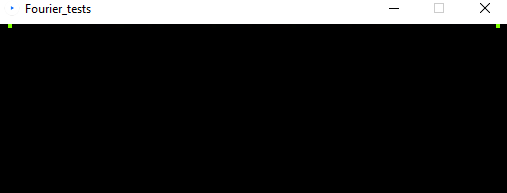I am very new to the concept of Fourier transforms and DFTs so please explain in as simple terms as possible.
I am messing around with Fourier transforms in processing. I wanted to determine the average wavelength of an input - trigonometric or otherwise.
void generateHeightsCos()
{
heights = new float[xResolution][yResolution];
for (int y = 0; y < yResolution; y++) {
for (int x = 0; x < xResolution; x++) {
heights[x][y] = cos(2 * 3 * PI * x / xResolution);
}
}
}
I use the above code to generate a cosine curve (I'm also using a 2d input and 2d Fourier transforms which is unshifted but I can shift it). The transform looks like this - I don't think there's any problem here.
So now to get the average frequency (not wavelength I know but its in frequency domain) I used the following code:
float GetMeanFrequency(Complex[][] input)
{
float total = 0;
float totalCounts = 0;
float count;
for (int y = 0; y < yResolution; y++) {
for (int x = 0; x < xResolution; x++) {
count = input[x][y].magnitude();
total += x * count;
totalCounts += count;
}
}
return total / totalCounts;
}
So the problem with this is the symmetry of Fourier transforms. Because of the symmetry it will return xResolution / 2 no matter the frequency of the input. I could add a condition so it only checks the left half but then it won't work for higher frequency inputs.
All answers are appreciated.

